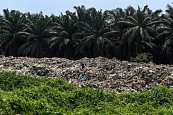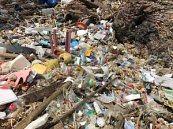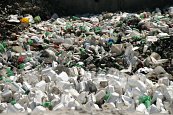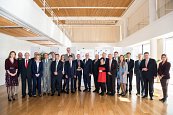Plasticity Bangkok at UN's Sea of Solutions
Published on 12 November 2019
With plastic pollution one of the most urgent environmental issues facing governments, corporate boardrooms and individuals, Thailand is taking the lead in bringing about positive change for the reduction in plastic waste, with a four-day SEA of Solutions Week, hosted by UN Environment. Plasticity Bangkok, which occupies Day #2 of the event, will bring together more than 450 local and international participants to collaborate on solutions that are relevant and scalable within Thailand and the region.
“For nearly 10 years, our one-of-a-kind innovation forum, Plasticity, has been working with the business community across the globe.” says Plasticity Founder, Doug Woodring.
“Solutions that Plasticity has helped to spawn in the past include technologies to improve sorting for recycling, bio-based innovations – and even the use of “tragic plastic” (unsorted and hard-to-recycle plastic) for construction materials. At Plasticity Bangkok, investment in new equipment and programs that will help communities bring value to plastic waste, allowing for the ‘reincarnation’ of plastic, will be a major topic.”
Recyclers Cringe as Southeast Asia Says It’s Sick of the West’s Trash
Published on 07 June 2019
Within months, Malaysia, which has a sizable ethnic Chinese population, had replaced China as the world’s largest importer of plastic scrap. But this country, and others across the region, soon saw the waste as an environmental nightmare, and a heavy backlash has begun. With public support, some advocacy groups have urged officials to permanently ban the import of plastic waste.
But at a time when the world is awash in such plastic, some experts worry that this backlash could block the flow of raw material to Southeast Asia’s aboveboard recyclers and manufacturers — and raise the chances that plastic scrap will end up in rivers, oceans, dumps and illegal burn sites.
New Plastics Border Control: Why Basel Convention Amendments Could Backfire
Published on 24 May 2019
If governments are united in a historic way on a topic, and business entrepreneurship is flourishing, what could possibly throw a spanner in the works? Myopia.”— Trish Hyde.
Plastic is without borders. Travelling freely, it is literally in almost all parts of the world. It is welcome news, therefore, that governments globally have united to endorse the Basel Convention amendments which are aimed at stopping developed countries from dumping waste plastic on developing countries, or to those with fewer regulations.
Avery Dennison Joins Plasticity Partners Program
Published on 05 September 2018
“Avery Dennison has eight ambitious sustainability goals that we have committed to meet by 2025, and we know that to achieve them we need to work collaboratively within our industry and beyond. Partnering with Plasticity enables us to work across our value chain to find systemic solutions to convert plastic waste into valuable second-life resources, which is a key priority for us.” Roland Simon, vice president of global procurement and corporate sustainability at Avery Dennison.
Plasticity Organizers Chose Malaysia as Event Site
Published on 03 September 2018
A presenter from United States-based Avery Dennison will be on hand to discuss how labels lend color, branding, bar code tracking and legally required information to packaging. However, even in packaging recycling processes, “much of the time, the label is removed, and discarded as waste.”
Avery Dennison indicates it has earmarked label waste as a top strategic challenge in its 2025 sustainability goals, and at the Labelexpo 2018 event in suburban Chicago, the company’s corporate display used panels made from 50 percent consumer label scrap.
'Clean Tax Cuts' and the Global Free Market for Plastic Solutions
Published on 28 August 2018
Clean Asset Bonds and Loans appear particularly well designed to drive down costs and increase investment for a long list of assets that reduce and recycle waste: integrated cart/truck systems; all the sorting, cleaning, grinding and processing technologies for material recovery facilities (MRFs) and processor plants; long-term recycling contracts; plants that re-manufacture recycled plastics into new products; storage facilities and quality testing equipment for recycled materials; software for resource recovery exchanges; low-emission waste-to-fuel and waste-to-clean-energy systems; manufacture and deployment of filters and catchment devices for washing machines, rivers, bays and the ocean; and advanced wastewater treatment technologies.
Scaling Plastic Waste Solutions, Even if Not Perfect
Article by Tom Domen (Ecover) and Doug Woodring (Plasticity Forum)
Published on 16 August 2018
Plastic pollution in waterways and coastlines is an overall system failure of how we design, use and dispose of materials. The myriad of lightweight, durable plastics makes it incredibly hard to recover and sort these resources into usable quantities of similar polymer types. This reduces its embedded value and incentive for collection.
The lack of localized recycling facilities in smaller cities, municipalities and rural areas exacerbates low recycling rates. By not having even basic recycling systems and relatively simple equipment in place, the opportunity to create value from our waste is lost.
"Reading the Tea Leaves" with Single Use Plastic
Published on 22 June 2018
On a daily basis, more people are impacted by trash and dirty water than by climate change. This is not to say that one problem is bigger than the other, but plastic pollution is one of the more complicated issues to solve as it is so widely dispersed.
Dirty water from trash impacts drinking water, hygiene, disease, tourism, and air pollution from open-pit burning of trash. It also impacts fishing, agriculture, maritime transport, and ecosystems on land and water, and the carrying of toxicity in broken-up micro plastic, which has entered the human food chain.
Prince's Prize for Innovative Philanthropy Awarded to Ocean Recovery Alliance
Published on 25 January 2018
Mr. Douglas Woodring, Founder and Managing Director of Ocean Recovery Alliance, and the Plasticity Forums, has been awarded 2018 Prince’s Prize for Innovative Philanthropy by H.S.H. Prince Albert II of Monaco.
Ocean Recovery Alliance focuses on bringing together new ways of thinking, technologies, creativity, collaboration, and initiatives to help improve the ocean environment.
The Award is a global initiative jointly developed by The Prince Albert II of Monaco Foundation and The Tocqueville Foundation. Its goal is to highlight projects and initiatives that have triggered innovative activity in the field of philanthropy, seeking out individuals and organizations that inspire others and demonstrate strong impact or potential impact.
Surf’s Up! Thai Company Launches Novel Plastic Offset Program
Published on 10 November 2017
Starboard created its new offset program in coordination with the Plastic Disclosure Project and PDP’s methodology for measuring a company’s plastic footprint. The PDP is a voluntary initiative that asks organizations to do annual reporting regarding their production, use and handling of plastic and plastic waste.
PDP notes that such a baseline analysis is vital, because “if you don’t measure it, you can’t manage it.” By having an accurate understanding of the amount of plastic that flows through an organization, it notes, efficiencies can be gained in cost reduction, wastage reduction, new design, new materials, and better recycling.










